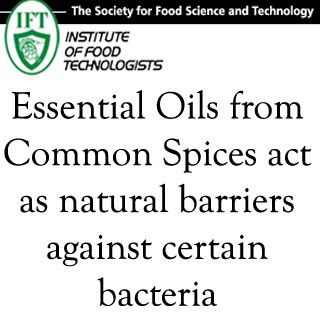
Experts at Processed Foods Research and Produce Safety and Microbiology units of Western Regional Research Center from the U.S. Department of Agriculture (USDA) probed the efficiency of the oils by including them in thin, tomato-based antimicrobial coatings called as edible films. In addition to its flavor properties, tomatoes are claimed to possess several favorable nutritional and bioactive components that may profit human health. Edible tomato films containing antimicrobials may defend food against infections by pathogenic microorganisms. The test was conducted by laying the films on top of the bacteria and also by exposing the bacteria to the vapors arising from the film.
The outcome of the test claimed that oregano oil constantly repressed the growth of all three bacteria. Garlic oil was apparently not capable against E. coli or Salmonella, but was supposedly useful against Listeria. Oregano and allspice oils were supposedly successful against E coli and Salmonella. Vapor tests of oregano and allspice oils apparently signify that these two oils may disseminate more capably through the air than through straight contact with the bacteria. Listeria was apparently not much resistant to EO vapors while E. coli was supposedly more resistant.
Lead expert W. X. Du, commented, “Incorporating essential oils into edible films provides a new way to improve the safety and shelf life of foods, which will provide multiple benefits to consumers.â€
Edible films for fruits and vegetables may serve as carriers for food additives counting plant-derived, protected antimicrobials. The increased curiosity in antimicrobial films may be the outcome of bigger consumption of contaminated fresh-cut produce.
In a connected study from the same USDA research group, it was discovered that cinnamon, allspice and clove could have a new use in the kitchen. Essential oils (EOs) from these plants could be used to shelter food from bacteria. They apparently assessed the physical and antimicrobial properties of allspice, cinnamon and clove bud oils in edible films of apple puree post 24 and 48 hours. Edible films and coatings on food products may provide as carriers for a broad variety of useful food additives, including antimicrobials. The oils were apparently included into edible apple puree film at ranges of about 0 to 3 percent.
The experts found that the antimicrobial activity of cinnamon oil was supposedly considerably superior to allspice and clove bud oils against E. coli, Salmonella and Listeria. Edible films having 3 percent or less of cinnamon oil were seen to be effective against the three pathogens. Salmonella displayed the least resistance to the EOs, while E. coli apparently showed the most. Low concentrations about 1 percent and 1.5 percent of allspice and clove bud oils curbed the development of Listeria.
Lead expert R.J Avena-Bustillos mentioned that the results show that apple-based films with allspice, cinnamon or clove bud oils were effective against the three bacteria. The essential oils have the potential to provide multiple benefits to consumers.
This study was published in the Journal of Food Science by the Institute of Food Technologists.
